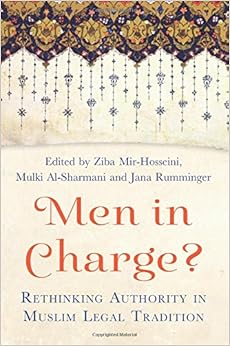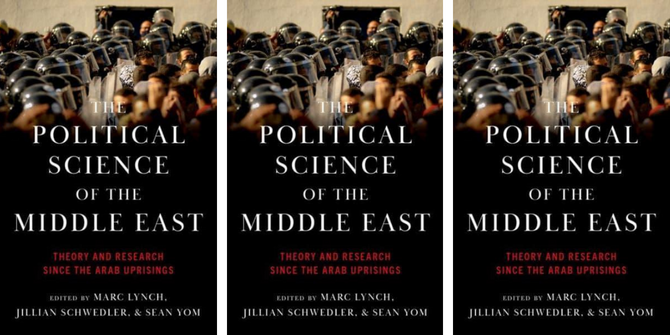Recently, exciting new feminist research has been challenging gender discrimination and male authority from within Islamic legal tradition: this book presents some important results from that research. Isabel López Ruiz thinks is a necessary book, and one which is carefully designed to combat misconceptions and prejudice.
 Men in Charge? Rethinking Authority in Muslim Legal Tradition. Ziba Mir-Hosseini, Mulki Al-Sharmani and Jana Rumminger (eds). One World Publications. Dec 2014.
Men in Charge? Rethinking Authority in Muslim Legal Tradition. Ziba Mir-Hosseini, Mulki Al-Sharmani and Jana Rumminger (eds). One World Publications. Dec 2014.
“Muslim legal tradition does not treat men and women equally”. This is the bold sentence that opens Men in Charge? Rethinking Authority in Muslim Legal Tradition, edited by Ziba Mir-Hosseini, Mulki Al-Sharmani, and Jana Rumminger. This volume comes as sections of the feminist movement move to their ‘third wave’ with a focus on intersectionality. Thus, it is more relevant than ever before, as the relationship between organised religions and feminist beliefs is brought under closer scrutiny. With a wide array of Muslim critics dissecting the origins of this legal imbalance between men and women, Men in Charge? bridges the gap between Muslim and Feminist ethics in an accessible and thought-provoking manner.
The basis of this volume rests on challenging two fundamental legal concepts: qiwamah, which generally denotes the authority of a husband over his wife, and wilayah, the right and duty of male family members to exercise guardianship over female members. From the outset, Men in Charge? is determined to clarify the origin of these assumed patriarchal beliefs, something that is extremely necessary, given the amount of repeated misrepresentations of Muslim beliefs that are predominant in Western media. The findings will shock those who believe Islam is an inherently misogynist religion.
Whilst verse 4:34 of the Qur’an “is often invoked as the textual basis for the assumed normativity of male authority and hierarchical gender relations”, neither of the two aforementioned concepts, which now dominate Muslim family law, are intrinsically sexist. For one, qiwamah does not even appear in the Qur’an, and when wilayah is mentioned, it is not with regards to men’s authority over women, but rather God’s protection of all humans.
Men in Charge? goes on to test commonly held assumptions even further. From challenging ideas of seemingly homogenous legal systems across all Muslim countries, to recording real-life experiences of Muslim women from over 10 countries worldwide, it offers an egalitarian vision of Muslim juristic tradition based on Sufi thought. The different chapters in this book reveal the nuanced, often contradictory, but always compelling reality of modern Muslim family law. Whilst some sections focus primarily on qiwamah and wilayah as religious and legal postulates, others discuss the practical applications of said concepts in real life, coming together to build an exciting piece of scholarship.
 Photo Credit: Themeplus. CC-BY-SA.
Photo Credit: Themeplus. CC-BY-SA.
Asma Lamrabet’s chapter “An Egalitarian Reading of the Concepts of Khilafah, Wilayah, and Qiwamah” could have easily served as an ideal introductory point, as it makes an important set of distinctions between different concepts that will then be utilised in the rest of the chapters. Lamrabet successfully demonstrates how, at the heart of Islam, lies the idea of equality between all of God’s human beings, regardless of whether they are men or women. In order to do so, she divides Qur’anic verses into three different types: verses with universal aims (which advocate ‘justice, equality, fairness, and respect for human dignity’); verses that are confined in their application to the context of the revelation (i.e. confined by specific sociohistorical moment of seventh-century Arabia and which relate to issues like slavery, capital punishment, or war spoils); and verses that need to be reinterpreted in new social contexts (such as those dealing with women’s issues).
An overriding belief held by many of the contributors to Men in Charge?, is that although the prejudice often highlighted in verses such as 4:34 of the Qur’an can be attributed to its specific historical context, such anachronistic opinions have no place in the modern era. They merely had been dragged into the modern day through out-dated patriarchal institutions and figures. To counter the misogyny of verses like 4:34, Lamrabet highlights the importance of other verses (9:71) that have long been overlooked but which “lay the ground for the concept of equality between men and women”. She also exposes the explicitly contradictory nature of assumptions such as a wife’s duty of obedience to her husband, when one of the founding principles of Islam is “obedience and submission […] only to God”. By clearly deconstructing the prejudices which seem to taint Islam as a whole, Lamrabet lucidly presents a convincing case for an egalitarian reading of Islam, grounding it in its very own scriptures.
In order to understand the impact of the concepts of Wilayah and Qiwamah on real-life legal codes, Lynn Welchman explores the differences between their applications in different countries (focusing on Morocco and UAE) in her chapter “Qiwamah and Wilayah as Legal Postulates in Muslim Family Laws.” A common staple of Western media is to overlook the differences between practices in different Islamic countries. This chapter is therefore all the more surprising and, of course, necessary. Whilst Morocco has been leading the way for other Muslim countries in terms of equality between men and women, other countries such as Yemen have also removed damaging duties (such as a wife’s obedience to her husband) from their statutory laws. In fact, Welchman quotes other authors like Aziza Dargouth-Medimegh to draw parallels between Muslim and Western legal codes, as in many occidental countries, the identification of the male as head of the family was a prevalent feature before the 1960s.
In a similar vein, the volume’s penultimate chapter, “Understanding Qiwamah and Wilayah through Life Stories” by Mulki Al-Sharmani and Jana Rumminger, is possibly the most compelling of all. It presents a series of real-life testimonies by Muslim women across the world, offering readers an insight into the impact of traditional Muslim family laws on their lives. The experiences described are divided into sections (e.g. sexual relations within marriage, polygamy, and divorce) and display examples of women bravely standing up for themselves in the face of discrimination and even using unfair laws to their advantage. This chapter is the book’s most emotional and I would have loved to have read even more stories like the ones featured here, instead of the lengthy methodological discussion which preceded them.
Men in Charge? is bound to be a key scholarly text for anyone researching or studying law or Islam in general. It is a necessary book, one which is carefully designed to combat misconceptions and prejudice, and one which, most importantly, has a practical focus: all of the book’s contributors are writing for change. In reminding us that there is a difference between the Qur’an and the subsequent misogynist interpretations at the hands of certain actors (“Shari’ah court judges, community leaders, imams, women in leadership positions who perpetuate patriarchal structures of power, etc”), these authors pave the way for a brighter and fairer future for Muslim women.
———————————————————————————-
Isabel López Ruiz is currently completing an MA in Twentieth-Century Literary Studies at Durham University, having previously graduated from the University of Granada (Spain) with a BA in English Language and Literature. Isabel has written articles for the Times Higher Education (both online and in print) and The Huffington Post. She also sub-edits Palatinate, Durham’s Student Newspaper. Her research interests centre on feminist literary criticism and 20th century women’s poetry, especially Sylvia Plath. She tweets at @packt_sardines. Read reviews by Isabel.






